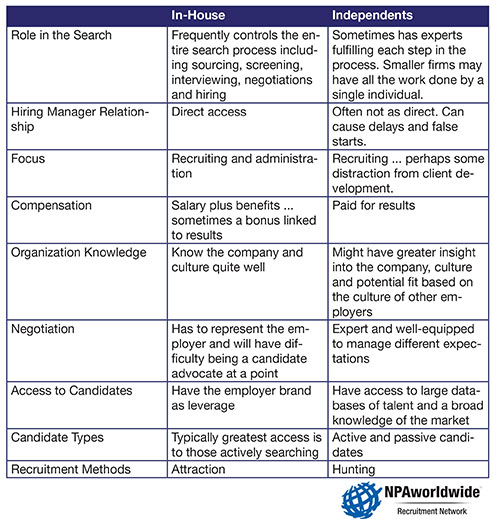 In-house and independent recruiters play unique roles in the recruitment process, let us start there. While both have a similar objective…fill the open positions…each is likely to use a different approach. In-house recruiters, also known as corporate recruiters, are direct employees of the company and typically work under the direction of the employer’s HR function. Independent recruiters, also known as headhunters or agency recruiters, are self-employed and work as intermediaries between the hiring manager and potential candidates to find the best talent for multiple employers or clients.
In-house and independent recruiters play unique roles in the recruitment process, let us start there. While both have a similar objective…fill the open positions…each is likely to use a different approach. In-house recruiters, also known as corporate recruiters, are direct employees of the company and typically work under the direction of the employer’s HR function. Independent recruiters, also known as headhunters or agency recruiters, are self-employed and work as intermediaries between the hiring manager and potential candidates to find the best talent for multiple employers or clients.
Because the structure of the client relationship differs between in-house and independent recruiters, they share basic principles of recruitment but are likely to operate quite differently. Each employer situation is unique. Sometimes the work of finding and hiring talent will be best performed by in-house recruiters, while at other times it may be ideal to use an independent to complete a search. This comparison is not to suggest one method is always right but rather to suggest that a full and careful examination of all options is important.
I believe that we can learn from the past. There is also a part of me that knows someone else has figured out most of the problems or addressed most of the situations we encounter. We can usually benefit from a good hard “look before you leap” moment when making a directional change. There is always time to learn from others and look for parallels we might consider before implementing change for the challenges we face.
The move from independent to in-house recruitment is one of those opportunities. Decision makers should proceed with caution and consider all options before finalizing on a short-term solution.
In the last few years there has been significant movement from independent recruiters to an in-house team. There are many reasons, but one that is often cited is the cost of independents. This is where I see a parallel that might add perspective to a change. In the 1990s, companies were taking printing/copying needs in-house to their own print shops. Why? They planned on saving bundles of cash. The reality, many did not fully understand and load the full costs of such operations and their real costs of printing went up. Once you own the capacity, you need to keep it fully employed or it is a non-productive resource. Companies not making that directional change to in-house printing saw the supply of independent printing capacity grow because market capacity was being taken “inside.” By staying the course and employing the open market for print/copying services, these companies experienced better service at reduced costs without taking on the burden of owning a print shop. Years later many of those companies have again outsourced their print needs. The lingo of the day was a return to “focusing on core competencies.”
There is a phenomenon known as fast thinking. There is a best-selling book published in 2011 by Nobel Memorial Prize in Economics Laureate Daniel Kahneman, called Thinking, Fast and Slow. Fast thinking does not always serve us well. It allows us to use quick calculations and random assumptions to make far-reaching decisions. When moving recruitment in-house there are things to consider, some easily captured by fast thinking, some likely to be missed. Consider the easy ones:
- Salary and benefits for in-house recruitment staff
Ok, no brainer, right?
What about:
- Cost of office space and real-estate for the in-house team?
- Training for the staff?
- Management time?
- Cost of fall-off and turn downs are now sunk costs…right? No guarantee to fall back on now.
- Recruitment tools? Independents spread these costs over many companies. Once in-house, you will pay the full cost for your business alone. These costs can be significant.
- When hiring gets put on hold because of a new government regulation, a change of business strategy, or the action of a competitor, does the cost of the in-house team go away?
- What happens to excess capacity? Will you be constantly hiring and firing the team you count on to bring you top talent? What are those costs?
Some other considerations to factor in to any decision to bring recruitment in-house include:
- Will the quality of the recruiters hired for in-house rival that of independent recruiters?
- Will you be able to hold onto the top-performing recruiters hired?
- Can in-house recruiters headhunt the most talented people in the industry?
- Can in-house recruiters call a competitor’s employee without creating great risk for your business?
- Does the relative skill of a recruiter influence the quality of talent hired?
- What happens if you need to go back to independents to fill over-capacity issues or loss of in-house recruiters? Will you get the same level of service as before you took everything in-house?
- Is this a long-term play or a short-term cost-saving strategy?
Comparing In-House Recruiters to Independent Recruiters
Both approaches to recruitment have value. A well-planned recruitment strategy would assess the respective capabilities of each method and understand the differences. In the process, it will become clear which approach is best able to support your recruitment needs. Sometimes the best response is a mix of in-house and independent recruitment. Take the time to fully understand the costs behind any decision and determine a breakeven point. If you are not hiring for many positions over a long period of time, the costs of in-house recruitment may be a burden you are unable to justify.
This shift from independents to in-house is a business decision that should be a comparison of costs, results and time. There should be a “breakeven” point that is crossed. It is likely a function of costs and time. Do the math, as they say. A decision like this is no time to employ fast thinking. Figure out your proposed point of breakeven. I suspect that it is more difficult than imagined to reach that point unless your business is hiring massive quantities of employees regularly.


Great insights @Dave! Thanks for sharing.
In a VUCA world, it is often the lean and the nimble “David” firms that have been able to perform better than the “Goliath” gigantic organisations-as they have been able to pivot faster.
The advertising world too has seen the decline of the large agencies, and the rise of creative shops.
And if we look at the other established professions-the legal, doctors, accountants-I feel there is a trend that large organisations are often generalists- engaging specialists for specific mandates.
Maybe we will Recruitment also take the :horses for courses” route?
AK